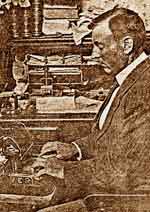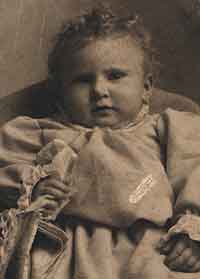Camp County, Texas. 1879. A dying woman lies on the floor. A four-year-old girl, tiny for her age, brings the woman a drink of water. She drinks it carefully, with one side of her mouth. “Go to sleep,” a man’s voice tells the little girl.
“No, I don’t want to.”
“Go to sleep.”
“Don’t spank my baby,” the dying woman says.
Ghosts, now. Real, then.
The little girl, left orphaned, was my mother’s mother, Ella Gertrude Eskridge. She told her life story, all she could recall, to my mother when Ella was seventy-eight years old.
“That is all I can remember about my mother,” Ella said to her middle daughter, Beulah, my mother, who took the words down in shorthand.
“After she died, there was just a half-uncle and his wife. She didn’t like me. Just because I was better than her, or so she thought. She would tell me she was going to give me away to niggers.”
Another family, the Burgesses, took her. Kept her until she finished the eighth grade.
“I worked in the field, I got up at four in the morning. Made a fire in the cook stove, helped get breakfast. I fed the hogs. It was a small farm but enough to have a hired hand. I would stay out of school to help with the washing.”
She didn’t go to high school but “worked out” for two families as a mother’s helper. That lasted two years. “I had to wash, help cook, but I did not work in the field. And I helped the woman take care of the baby.”
Hardly any boys asked her to parties or buggy rides or to see a show.
“You wasn’t very well thought of if you was ‘working out,’ no way.”
But everybody was welcomed at the square dances, so Ella — or Gertie, as she was also known — didn’t need a boy to escort her.
“Mister Dickey was the fiddler at one of them. He asked me to dance. And good-looking! I didn’t know whether I fell in love with him then. I did know that he had nine kids!”
My grandmother was nineteen at the time, dainty, only five feet tall. My grandfather, William Bascomb Dickey, was thirty-four years old. His wife had recently died.

“We went together about six months. He would take me to dances and house parties. He asked me to marry him. He told me he wanted a housekeeper. I was just a young girl and wanted a home of my own and somebody to take care of me. In fact, I think I never did love that fellow.
“We just went to a justice of the peace and got married. For the honeymoon we went to his house where there was nine children. There was two big rooms, two side rooms, and he built on a new room. We lived there a year.”
Three of the boys soon left home. So there were only six kids remaining for little Ella to take care of.
“My own children was first Florence, then a miscarriage, then Eaph. After Eaph we traveled in a covered wagon for a year or two.”
My grandfather didn’t have a regular job at that time.
“He would get a day’s work,” Ella said. “It didn’t take much those days. Just bacon and eggs on a day’s road.” Sometimes she used the expressions of her girlhood as she thought about the past.
“We crossed the Arkansas River one time, drove the wagon and team across that river into Arkansas. We stayed all night and drove back, and that bridge could have went down any old time. We just taken a chance. Back and forth, and all in one day. And he did it just to be a daredevil!”
Next came Jesse Bryan, born in 1899, three years after William Jennings Bryan made his “Cross of Gold” speech and ran for president. Mabel was born in 1902.
Ella loved to play with her children.
“We would play set-the-table. We would take broken glass, put them on a board and play setting the table.”
Soon William Bascomb Dickey began buying and selling land. He had some property in Guymon, Oklahoma, and made a dugout for shelter.
“Kitchen, dining room, sleeping room, all in one. Built-in bunks. Used raw lumber. Still had bark and was full of chinches [bedbugs, from the Spanish] that would get you at night. The biggest day’s work was shaking the bedclothes to get rid of the chinches.”
It was April 27, 1905, that Beulah May Dickey was born in the dugout in Guymon.

“There was a buggy for you; we was prosperous then,” the tiny, white-haired, blue-veined Ella told Beulah almost half a century later. “It cost twelve dollars. I bought some yarn, nice yarn, and hired somebody to make sweaters; she crocheted them. I would push the buggy, walk with the buggy with you in it, and I was very proud. You was skinny and pretty and had blonde hair.”
In 1908 the family moved to Wilcox, Arizona. They lived in an old church-and-schoolhouse, with blackboards in some of the rooms, even the kitchen. The air stank from the outhouse. Flies swarmed. Two more boys were born, Harold and Hubert.
In the winter of 1911 Ella’s husband went to prison.
“Swindled the government. He wrote us letters with cartoons, lots of funny faces.”
Two more children came, Vesta Vae (1912) and Woodrow Wilson (1916). In 1920, Ella obtained the first divorce ever to be entered in the records of the Dickey family all the way back to Scotland and beyond.
William Bascomb Dickey then married a younger woman and fathered even more children.